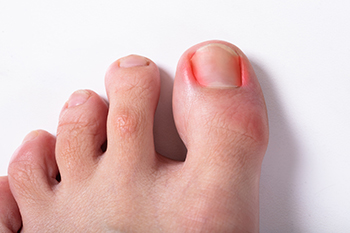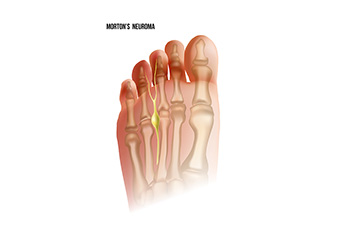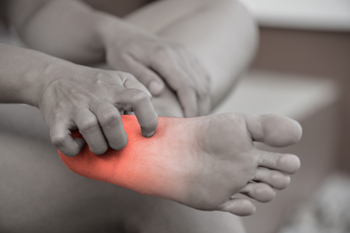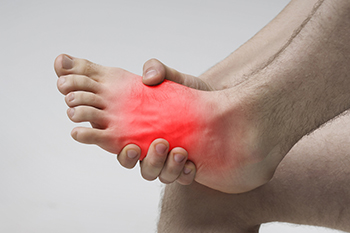6650 Frankford Ave
Philadelphia, PA 19135

Ingrown toenails can afflict individuals from various walks of life, but certain factors increase susceptibility to this uncomfortable condition. People with naturally curved toenails may find themselves more prone to ingrown toenails, as the curvature can encourage the nail to grow into the surrounding skin. Additionally, individuals who wear tight or ill-fitting footwear may unknowingly subject their toes to constant pressure, increasing the likelihood of ingrown toenails. Poor nail-trimming habits, such as cutting nails too short or rounding them at the edges, can also contribute to this ailment. Those with diabetes or circulation issues must be especially vigilant, as they may experience heightened vulnerability. Understanding the causes and recognizing one's predispositions is essential for proactive ingrown toenail prevention. If you have developed an ingrown toenail, it is strongly suggested that you are under the care of a podiatrist who can offer correct preventive and treatment methods.
Ingrown toenails may initially present themselves as a minor discomfort, but they may progress into an infection in the skin without proper treatment. For more information about ingrown toenails, contact John M. Fanelly, DPM of Northeast Philadelphia. Our doctor can provide the care you need to keep you pain-free and on your feet.
Ingrown Toenails
Ingrown toenails are caused when the corner or side of a toenail grows into the soft flesh surrounding it. They often result in redness, swelling, pain, and in some cases, infection. This condition typically affects the big toe and may recur if it is not treated properly.
Causes
You are more likely to develop an ingrown toenail if you are obese, have diabetes, arthritis, or have any fungal infection in your nails. Additionally, people who have foot or toe deformities are at a higher risk of developing an ingrown toenail.
Symptoms
Some symptoms of ingrown toenails are redness, swelling, and pain. In rare cases, there may be a yellowish drainage coming from the nail.
Treatment
Ignoring an ingrown toenail can have serious complications. Infections of the nail border can progress to a deeper soft-tissue infection, which can then turn into a bone infection. You should always speak with your podiatrist if you suspect you have an ingrown toenail, especially if you have diabetes or poor circulation.
If you have any questions, please feel free to contact our office located in Philadelphia, PA . We offer the newest diagnostic and treatment technologies for all your foot care needs.

Morton's neuroma is a painful foot condition that affects the ball of the foot, most commonly occurring between the 3rd and 4th toes. It is not a true neuroma, as the name suggests, but rather a thickening of the tissue around the nerve that leads to the toes. The main symptom of Morton's neuroma is localized pain, which can vary from a mild discomfort to an intense, burning sensation. The pain is typically aggravated by walking, wearing tight or narrow shoes, or putting pressure on the affected area. Some individuals describe it as feeling like there is a pebble or a fold in their sock, even when there isn't. Tingling and numbness in the toes may also accompany the pain. People with Morton's neuroma often find relief when they remove their shoes and massage the affected area. Early diagnosis and appropriate treatment can help alleviate the pain and prevent the condition from worsening. It is suggested to seek medical attention from a podiatrist if you suspect you have Morton's neuroma.
Morton’s neuroma is a very uncomfortable condition to live with. If you think you have Morton’s neuroma, contact John M. Fanelly, DPM of Northeast Philadelphia. Our doctor will attend to all of your foot care needs and answer any of your related questions.
Morton’s Neuroma
Morton's neuroma is a painful foot condition that commonly affects the areas between the second and third or third and fourth toe, although other areas of the foot are also susceptible. Morton’s neuroma is caused by an inflamed nerve in the foot that is being squeezed and aggravated by surrounding bones.
What Increases the Chances of Having Morton’s Neuroma?
Morton’s neuroma is a very treatable condition. Orthotics and shoe inserts can often be used to alleviate the pain on the forefront of the feet. In more severe cases, corticosteroids can also be prescribed. In order to figure out the best treatment for your neuroma, it’s recommended to seek the care of a podiatrist who can diagnose your condition and provide different treatment options.
If you have any questions, please feel free to contact our office located in Philadelphia, PA . We offer the newest diagnostic and treatment technologies for all your foot care needs.

To diagnose peripheral neuropathy and determine what is causing it, a podiatrist may ask questions about symptoms, physically check troublesome areas, and test feeling, strength, and reflex actions in these areas. Blood tests are often ordered to look for common causes of foot neuropathy, such as diabetes or a vitamin B12 shortage. If further testing is needed, nerve conduction and electrical studies can be done to observe how nerves respond to small electric shocks, in addition to measuring muscle electrical activity. Underlying health issues or side effects of medication may surface during testing. In rare cases, a nerve sample from near the ankle might be taken for a biopsy to look for specific neuropathy indicators. Imaging such as X-rays, CT scans, or MRIs might also be performed to find the root cause of neuropathy. If you suffer from foot neuropathy, it is strongly suggested that you make an appointment with a podiatrist for a thorough examination and necessary testing done to determine the root cause of the problem prior to proceeding with treatment to ease your discomfort.
Neuropathy
Neuropathy can be a potentially serious condition, especially if it is left undiagnosed. If you have any concerns that you may be experiencing nerve loss in your feet, consult with John M. Fanelly, DPM from Northeast Philadelphia. Our doctor will assess your condition and provide you with quality foot and ankle treatment for neuropathy.
What Is Neuropathy?
Neuropathy is a condition that leads to damage to the nerves in the body. Peripheral neuropathy, or neuropathy that affects your peripheral nervous system, usually occurs in the feet. Neuropathy can be triggered by a number of different causes. Such causes include diabetes, infections, cancers, disorders, and toxic substances.
Symptoms of Neuropathy Include:
Those with diabetes are at serious risk due to being unable to feel an ulcer on their feet. Diabetics usually also suffer from poor blood circulation. This can lead to the wound not healing, infections occurring, and the limb may have to be amputated.
Treatment
To treat neuropathy in the foot, podiatrists will first diagnose the cause of the neuropathy. Figuring out the underlying cause of the neuropathy will allow the podiatrist to prescribe the best treatment, whether it be caused by diabetes, toxic substance exposure, infection, etc. If the nerve has not died, then it’s possible that sensation may be able to return to the foot.
Pain medication may be issued for pain. Electrical nerve stimulation can be used to stimulate nerves. If the neuropathy is caused from pressure on the nerves, then surgery may be necessary.
If you have any questions, please feel free to contact our office located in Philadelphia, PA . We offer the newest diagnostic and treatment technologies for all your foot care needs.

Stress fractures, which are generally attributed to overuse, primarily affect weight-bearing bones and are often triggered by a sudden increase in physical activity. This serves as a significant risk factor for microscopic bone fractures in the feet. Embracing a new sport or intensifying exercise routines can elevate the likelihood of stress fractures. Biomechanical issues, such as abnormal gait patterns like flat feet or high arches and poor running form can also heighten the risk. Wearing inadequate footwear, including ill-fitting or worn-out shoes that offer insufficient support, places added stress on the foot bones. Nutritional deficiencies, particularly in calcium and vitamin D intake, weaken bones and make them more susceptible to such fractures. Hormonal changes, especially in women, like amenorrhea, can disrupt hormone balance and reduce bone density, which further increases the risk of stress fractures. Pain that starts during physical activity and worsens with continued exertion is a common symptom. Swelling in the affected area indicates inflammation, and tenderness of the bone to the slightest touch is another indicator. If these symptoms persist for about a week, it is suggested that you make an appointment with a podiatrist for a full exam, which may include imaging tests, as a foot stress fracture may not be visible on an X-ray.
Stress fractures occur when there is a tiny crack within a bone. To learn more, contact John M. Fanelly, DPM from Northeast Philadelphia. Our doctor can provide the care you need to keep you pain free and on your feet.
How Are They Caused?
Stress fractures are the result of repetitive force being placed on the bone. Since the lower leg and feet often carry most of the body’s weight, stress fractures are likely to occur in these areas. If you rush into a new exercise, you are more likely to develop a stress fracture since you are starting too much, too soon. Pain resulting from stress fractures may go unnoticed at first, however it may start to worsen over time.
Risk Factors
Stress fractures do not always heal properly, so it is important that you seek help from a podiatrist if you suspect you may have one. Ignoring your stress fracture may cause it to worsen, and you may develop chronic pain as well as additional fractures.
If you have any questions, please feel free to contact our office located in Philadelphia, PA . We offer the newest diagnostic and treatment technologies for all your foot care needs.